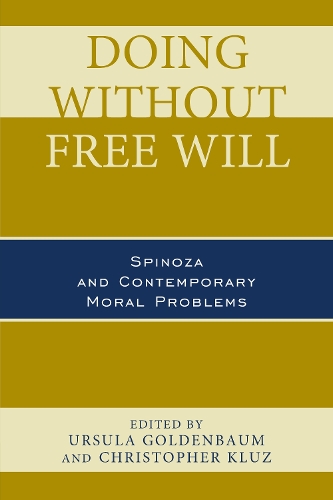
Doing without Free Will: Spinoza and Contemporary Moral Problems
(Hardback)
Publishing Details
Doing without Free Will: Spinoza and Contemporary Moral Problems
By (Author) Ursula Goldenbaum
Edited by Christopher Kluz
Contributions by J. Thomas Cook
Contributions by Ursula Goldenbaum
Contributions by Julia Haas
Contributions by Matthew Homan
Contributions by Christopher Kluz
Bloomsbury Publishing PLC
Lexington Books
8th October 2015
United States
Classifications
Professional and Scholarly
Non Fiction
Ethical issues, topics and debates
170
Physical Properties
Hardback
164
Width 159mm, Height 236mm, Spine 17mm
395g
Description
Doing without Free Will: Spinoza and Contemporary Moral Problems introduces Spinoza into the contemporary discussion on free will and on moral problems surrounding this discussion. Traditional Western moral philosophy, for the most part, has been built on the assumption of free will as a special human capacity to freely choose actions without being determined in that choice. This idea draws increasing critique, fueled recently especially by the ever new findings of neuroscience. But how can we develop a moral philosophy without free will Spinoza faced a similar challenge when writing his Ethics during the rise of modern science and its deterministic model of nature and, for this reason, has much to offer the current discussion. Not only does he provide a foundation for understanding moral responsibility without free will, he also provides an explanation and solution to the classical problem of akrasia precisely because he argues the will is not free. He worked out an entirely new system of moral philosophy that can help resolve the meta-ethical dilemma between absolutism and relativism, showing how moral values evolve naturally within society. Despite denying the traditional God-like power of free will Spinoza developed a robust concept of freedom, one that is distinctly human and viable today. His modernity comes to light when we look at his answers to the much discussed questions whether it is possible or even desirable to develop objective instead of reactive attitudes toward our fellow human beings. His answers, perhaps surprisingly, resemble positions held by some contemporary philosophers.
Reviews
I applaud the goal of bringing Spinozas views into contemporary debates.... [E]arly modern scholars will find here some fine research by up and coming scholars. * Journal of the History of Philosophy *
Ursula Goldenbaum and Christopher Kluz's Doing without Free Will: Spinoza and Contemporary Moral Problems is the book that we have all been waiting for! Finally Spinoza's unique contribution of a conception of the goal of human life as freedom without free will has been reclaimed as the tertium quid and inserted into the stalemated contemporary philosophical debate between the two dominant strains of latterday Kantians and Humeans. Kudos to Goldenbaum and Kluz for spearheading this important project and for bringing together major contributors to reprise Spinoza's understanding of moral agency in the terms of the contemporary Anglo-American philosophical conversation. This is a great book and a needed contribution to both Spinoza studies and to the ongoing philosophical free will/determinism debate. -- Heidi Ravven, Hamilton College
Author Bio
Ursula Goldenbaum is associate professor of philosophy at Emory University. Christopher Kluz is assistant professor in the Institute for Liberal Education at the Catholic University of Daegu, South Korea.
